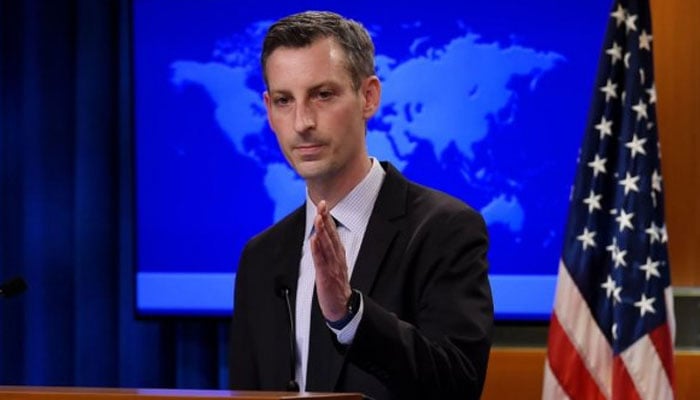US condemns blasphemous remarks by BJP members
Describing Pakistan as a partner, Ned Price says US looks for ways to advance this partnership in a manner that serves mutual interests
WASHINGTON: The United States has condemned the offensive remarks against the Holy Prophet (PBUH) made by two officials of India's ruling Bharatiya Janata Party (BJP) and urged India to promote respect for human rights.
The derogatory remarks by the BJP members have sparked outrage not only in the South Asian nation but across the globe. The Muslim nations, including Pakistan, have also condemned the remarks and demanded a public apology from New Dehli.
Protests also erupted in India during which several Muslims were killed by the security forces and the houses of the protesters were razed to punish them.
During a press briefing on Thursday, the US State Department Spokesperson Ned Price said they regularly engage with the Indian government at senior levels on human rights concerns including freedom of religion or belief.
He said they encourage India to promote respect for human rights.
Ned Price was asked to comment about the comments made by the BJP members and the houses of Muslims being razed.
“Well, this is something that we’ve condemned. We condemn the offensive comments made by two BJP officials, and we were glad to see that the party publicly condemned those comments,” he responded.
The Secretary said when he was last in New Delhi, last year, that "the Indian people and the American people, we believe in the same values: human dignity, human respect, equality of opportunity, and the freedom of religion or belief".
"These are fundamental tenets, these are fundamental values within any democracy, and we speak up for them around the world.”
India-Russia trade
The US official gave a vague response when asked about the Russia-India oil trade despite sanctions on Moscow and how Washington looks into this.
“We have had a number of discussions with our Indian partners, and the point that we have made is that every country is going to have a different relationship with Moscow. India’s relationship with Russia is one that developed over the course of decades, and it developed over the course of decades at a time when the United States wasn’t prepared or able to be a partner of choice for the Indian Government.”
“That has changed. This is a legacy of a bipartisan tradition now that has been the case for more than two decades. It goes back really to the Clinton administration, certainly to the George Bush administration, where the United States has sought a partnership with India, has sought to be a partner of choice for India, including when it comes to the security realm. Now, this is not a partnership that we were able to build in the course of days, weeks, or months. I mentioned before that India’s relationship with Russia was built up over the course of many decades. As countries reorient their relationship with Moscow, as we have seen many of them do, this will be a gradual process,” he said.
But throughout it all, we have made clear to our Indian partners that we are there for them, we are ready and able and willing to partner with them, and we’ve done just that, he added.
Pak-US ties
On a question of the status of ties with Pakistan, Ned Price said they have had a couple occasions now to meet with representatives of the new Pakistani government and referred to Secretary Antony Blinken’s meeting with his Pakistan counterpart Bilawal Bhutto in New York.
“It was a very good, constructive discussion regarding the full range of issues, including the issue of food security. We were there in New York at the time to deal with it and to deal with the many aftereffects of Russia’s invasion of Ukraine. That was also a topic of discussion.”
Price added: “Pakistan is a partner of ours, and we will look to ways to advance that partnership in a manner that serves our interest and our mutual interests as well.”
-
Security forces gun down 30 terrorists in multiple IBOs in KP: ISPR
-
MQM-P calls for new province in Sindh
-
US report validates Pakistan military edge over India: PM
-
Banned TTP poses serious threat to Pakistan security: UNSC panel
-
CM Afridi clarifies remarks on by-poll after ECP requests army deployment
-
Dubai sees 3.2m Pakistani passengers in 2025 as airport sets new milestone
-
Security forces kill 23 Indian proxy terrorists in KP's Kurram
-
Pakistan to construct island to boost oil exploration: report












